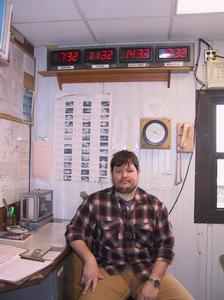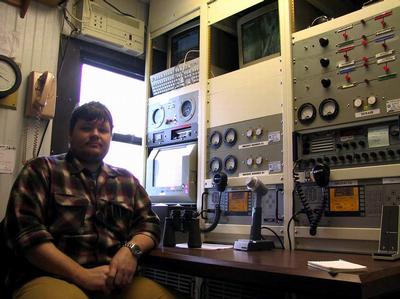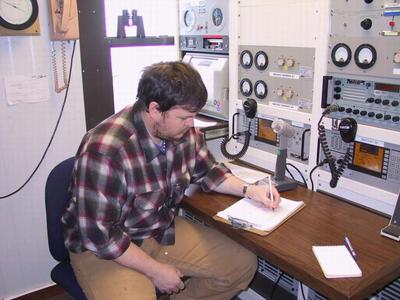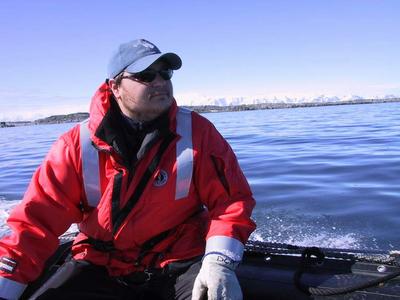28 January, 2002
WHAT TIME IS THAT PHONE CALL?
Dave McDonald is the Communications Technician here at Palmer
Station. Dave is from Greensboro, North Carolina. However, he has spent a
lot of time "on the ice". He has spent a summer and a winter at the South
Pole Station, two summers and one winter at McMurdo Station, and a summer
and a winter at Palmer Station.
Dave works with anything that has to do with electronics. He maintains
communications on and off the station. These communications might involve
satellites communications for voice, FAX, and telex. We use High Frequency
long range voice radio for communications with other Antarctic stations,
field camps, and aircraft. We use VHF/FM for local travel and
communications with nearby ships. We also use these hand-held radios around
the station to contact someone who is not inside by a telephone. In the
summertime, Dave is also busy keeping track of people who are out in
Zodiacs.
Dave says that there is an order of importance about communications. He has
a list that defines how he gets things done. These are the priorities for
uses of communications here:
1. Safety-anything that has to do with safety is the top priority.
2. Science-he checks with nearby stations to see if they need to send
data, and he makes sure that the science technician (here at Palmer) can
send his daily reports back to scientists in the United States.
3. Business-Raytheon Polar Services is the agency that has the contract
to provide support services for the US Antarctic Program. Their office is
in Denver, Colorado.
4. Morale-when possible, people at Palmer Station can use communications
for phone calls to relatives.
We use the 24-hour clock here at Palmer Station for communications. That
means that 1 am is 0100, 5:30 am is 0530, and 11:30 am is 1130. Noon is
1200. Then it really gets interesting. When you might say that the hour
after noon is 1 pm, we keep right on counting those hours. We say that 1 pm
is 1300. So, 5:00 pm is 1700, and 6:30 is 1830. Midnight is 2400, and then
we start all over again with a new day!
Here's the math: Dave has to set up a satellite telephone conference call
between the station manager here at Palmer, the manager at McMurdo Station
(a permanent US Antarctic Program station south of New Zealand), and the
business office in Denver, Colorado.
To answer this question, you need to know a little bit about the time zones.
Palmer Station uses the same local time as Chile. Chile is now on Daylight
Savings Time. McMurdo Station uses the same local time as New Zealand.
Denver uses Mountain Standard Time now. And, everyone can compare their
time to Universal Time (UTC), also known as Greenwich Mean Time (GMT) or
Zulu Time.
When it is 0800 in Denver, it is 1200 at Palmer Station, 1500 Zulu Time,
and 0400 THE NEXT DAY in McMurdo. Another way to think about that is that
Denver is four hours ahead of McMurdo Station and a day behind them. Palmer
is four hours ahead of Denver, and Zulu Time is three hours ahead of Palmer.
McMurdo Station is sixteen hours ahead of Palmer.
If the phone call is supposed to be made when it is 1800 in Denver on
January 28th, what time will it be at Palmer Station and what time will it
be at McMurdo Station? What date will it be at Palmer and McMurdo? What
does the Zulu Time clock say?

Dave McDonald sits under the four 24-hour clocks in his office. They show the time in Denver, Palmer, Zulu (GMT), and McMurdo.

Dave sits in front of the communications console.

Dave keeps a log of all the communications sent to and received from people in Zodiacs.

Sometimes Dave goes out in a Zodiac. Then there is someone else back at Palmer Station who is handling communications.
Contact the TEA in the field at
.
If you cannot connect through your browser, copy the
TEA's e-mail address in the "To:" line of
your favorite e-mail package.
|
